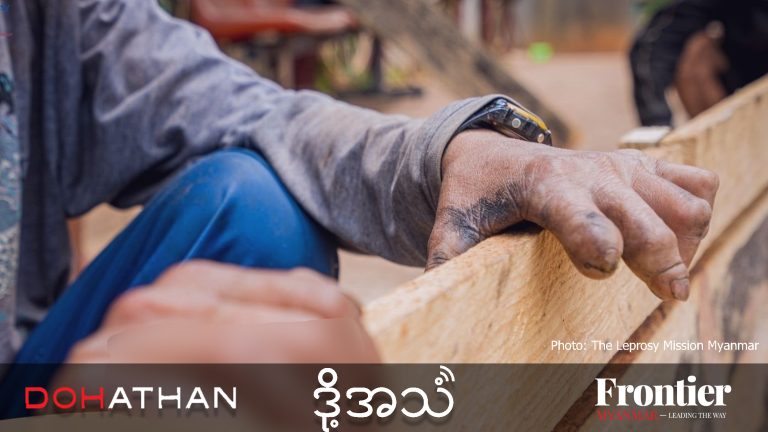Rampant inflation, low wages and a decrease in the production of staple foods are depriving millions of people of a nutritious diet, creating irreversible health problems and deepening cycles of poverty.
By FRONTIER
U Phoe Aye* remembers the time before the 2021 coup, when he could fully support his family as a motorcycle taxi driver in Yangon’s northern outskirts.
“I used to earn K8,000 to K10,000 daily before the military took over, but I now struggle to make K5,000 in a day. Not so many people take motorcycle taxis anymore,” the 45-year-old father of three told Frontier, alluding to the depressed economy.
His wife, Daw Nyo Nyo Sein*, tries to earn extra money for the family by selling fried crickets from their home in North Dagon Township. But with a combined daily income of about K14,000 (US$4.25 at the market rate), they are still struggling to put food to the table. Moreover, the food they eat is less nutritious than it used to be, taking a toll on their health.
Likely because of her poor diet, the 33-year-old woman was bed-ridden from May to August. She could afford to visit a doctor at a private clinic only once, and she didn’t recover until her neighbours donated some medicines to her.
“The doctor told me my muscles had lost suppleness due to malnutrition,” she said. “We can’t get proper nourishment. It will be hard for the kids and me to survive if our situation doesn’t change.”
Many families in Myanmar are facing the same difficulties. When the military seized power, it sparked a crisis that evolved into armed conflict, bringing an economy already battered by the COVID-19 pandemic to its knees. As people struggle to find work, rampant inflation is pushing families to the brink.
Nyo Nyo Sein said that before the coup, she could buy enough chicken, pork or fish to prepare lunch and dinner for the whole family for K3,500 a day, while the price of one pyi (around 2 kilogrammes) of rice was K1,500. Now she needs to spend K5,000 to buy the meat or fish necessary to prepare just one meal, while one pyi of rice costs K3,000.
“The recent spike in the price of basic food items in Myanmar is contributing to inadequate access to nutritious foods, which impacts the nutritional status of vulnerable populations,” the United Nations International Children’s Emergency Fund’s Myanmar office told Frontier.
Frontier found no comprehensive figures for malnutrition since the coup, but before the military takeover, global charity Save the Children said the nationwide prevalence of stunting was 35.1 percent, with wasting at 7.9pc. Malnutrition is therefore a longstanding burden and is closely linked to poverty, which has dramatically worsened since the coup.
In December last year, the United Nations Development Programme surveyed the commercial capital, with deputy country representative Mr Adnan Cheema telling Frontier, “one-in-four respondents to our survey in low-income areas of Yangon said that in the last 12 months, there was a time when someone in their household could not eat nutritious food due to lack of money and more than a third said they were eating less.”
But the problem extends well beyond Yangon. Last year, the UN World Food Programme said food insecurity affects 13.2 million people in Myanmar, about one quarter of the population.
Dr Daw Phyu Phyu Htay*, a former senior nutrition expert at the Ministry of Health who joined the Civil Disobedience Movement against the regime shortly after the coup, painted an equally bleak picture of the situation.
“Elderly people are dying due to a lack of food. In the suburbs of Yangon, many people can’t cook any more. In many areas all they can eat is rice gruel and many of them have to skip meals,” she said. “If the current situation continues, the problem of malnutrition is only going to get worse.”

A vicious cycle
The fall of the kyat to less than half its pre-coup value has made imported items much more expensive, including the palm oil that Myanmar kitchens largely run on. Another key import is fertiliser, the soaring cost of which has depressed agricultural output. Meanwhile, raging conflict between the junta and resistance in the central Dry Zone, one of Myanmar’s agricultural hubs, has further reduced the cultivation of rice, beans and edible oil crops, and therefore boosted the price of these food staples.
Phyu Phyu Htay said this is depriving people of the carbohydrate, protein and fats that make up a balanced diet. “The food that we must eat to stay healthy is currently not affordable and accessible in our country,” she said.
The consequences for children may be irreversible. “Children who are malnourished during early childhood may face greater challenges in attaining their full potential for growth and development, including brain development and school performance,” said UNICEF. “Women affected by malnutrition are also more likely to give birth to low-birth-weight infants and these children are more likely to suffer from wasting or stunted growth.”
Phyu Phyu Htay said malnutrition also weakens the immune system, increasing the likelihood of disease and prolonged periods of illness.
“Infectious diseases are more common among malnourished people, and they recover very slowly. Even if a patient who is undernourished recovers, there is a possibility the disease will appear again,” she warned. “As a result of not eating the right food, chronic non-communicable diseases are also likely to become more common in the next generation.”
Ma Shwe Zin*, a resident of Yangon’s Dagon Seikkan Township, is one of many whose poor diet is exacerbating their illness. Although aged only 24, she says she cannot work because she suffers from high-blood pressure and diabetes, and these conditions are worsened because she lacks the money for healthy food, leaving her trapped in a vicious cycle of poverty and ill health.
Her husband earns only K10,000 on a good day as a carpenter, compared to at least K15,000 before the coup, meaning they can only afford cheap, salty food like fermented tea-leaf salad and fish sauce with rice.
“I have high blood pressure, so these foods are bad for me, but I’m still eating them because I have no choice,” Shwe Zin said.
A doctor at a clinic in Yangon’s Tarmwe Township said that many people in the city are suffering from health problems derived from undernourishment. However, they commonly have to pay bribes to receive even rudimentary care at public hospitals that are on the brink of collapse. Meanwhile, he said, “They can’t come to private clinics like mine because they can’t afford it, so they go to clinics run by charities.”
Perhaps the most famous of such health centres in Yangon is the Muslim Free Hospital in Kyauktada Township. An official from the hospital who talked with Frontier on the condition of anonymity said that the number of patients with nutritional deficiencies has dramatically increased this year.
“This year, we have received more than 400 patients every day, and about 30pc of them show symptoms of malnutrition. In 2021 and 2022, the average number of daily patients was about 300, and 20pc of them suffered from malnutrition,” he said. “A large number of those patients come from the impoverished suburbs.”
Back in the suburb of North Dagon, Nyo Nyo Sein is apprehensive about the future.
“I’m worried I’ll be paralysed in bed again due to a lack of nutrition,” she said. “If that happens again, I’m afraid I’ll never recover. But we can’t choose what we eat.”
*denotes the use of a pseudonym for safety reasons







